Contents
Feeding honeysuckle after fruiting is a must if you want to get a good harvest next season. In autumn, the shrub restores the strength spent on the ovary of berries. Not only future fruiting depends on the quality of top dressing, but also how honeysuckle will overwinter.
Features of feeding honeysuckle in the fall
The berry culture survives frosty winters well, which is a big plus for the gardener. There is no need for extra work associated with sheltering bushes. However, for a successful wintering it is in the fall that it is important to feed the plant. Honeysuckle will gain strength, resistance to cold will increase.
It is important to remember that honeysuckle is a berry bush. In this group of plants, the root system lies in the upper layers of the soil. Usually this is a depth of about 40 cm. In snowy winters, snow provides additional protection from the cold to the roots. In its absence, frost “beats” the bare ground. If you do not feed the berry plant in the fall, the weak root system will freeze. In the spring, honeysuckle will have to be reanimated. You will have to forget about the harvest of the current season.
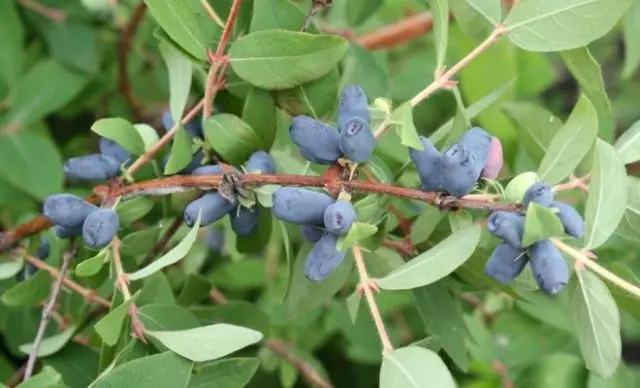
If you feed the berry in the fall, the next season the harvest will be more abundant, and the fruits will be larger.
To feed the berry plant, potash and phosphorus fertilizers are used. Suitable ash, green manure. Often gardeners use folk remedies. Best of all, the shrub perceives organic matter. It is optimal to feed honeysuckle with this fertilizer in July or the following months, which depends on the timing of the completion of the fruiting of a particular variety.
It is optimal to combine organic matter with mineral complexes. Many gardeners make combined mixtures for honeysuckle. However, professionals advise to alternate. It is better to feed organic matter in summer and autumn. In the spring, mineral complexes are introduced under the berry. This approach is explained by the intensity of decomposition of nutrient mixtures and the entry of useful components into the tissues of the shrub.
Watch the video for more information on organic nutrition:
Organic matter takes a long time to decompose. First, it is processed by beneficial microorganisms living in the earth. They secrete substances that honeysuckle absorbs by roots. The period from autumn to early spring is just set aside for the decomposition process. Honeysuckle wakes up early with the beginning of March. The root system immediately receives nutrients.
It is better to feed with mineral complexes in the spring, as these fertilizers quickly dissolve in water. They are useful substances ready for absorption. After hitting the ground, the honeysuckle root system immediately begins to absorb them and direct them through the tissues for the development of shoots.
A feature of top dressing after fruiting is the implementation of complex measures to help prepare honeysuckle for winter. When all the berries are harvested, the soil under the bushes and even between the rows is loosened to a depth of 10 cm. After digging, it is time to feed the berry with the selected fertilizer.
To begin the process of decomposition of organic matter, perform abundant watering. Water is needed in the fall and honeysuckle itself for energy storage. After watering, the trunk circle is mulched. Here, too, it is optimal to choose organic. A good mulch is peat, rotted compost. From above you can fall asleep with spruce needles. The prickly mulch will protect the honeysuckle from pests.
The convenience of caring for honeysuckle is explained by the fact that it gives the gardener a minimum of trouble in the fall. It is enough to feed the shrub, cut it and tie it with a rope so that the shoots do not break with snow. Shelter is not required.
How to choose autumn top dressing for honeysuckle for the winter
To feed the berry plant, experienced gardeners make their own fertilizer recipes. They observe the state of the plant, take into account the varietal characteristics, and know the composition of the soil where honeysuckle grows. It is easier for beginners to feed the culture with ready-made complexes offered by retail outlets.
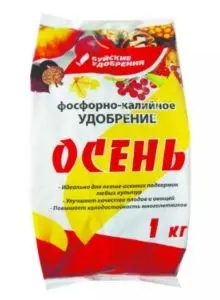
From mineral complexes for honeysuckle, you can purchase phosphorus-potassium fertilizer
When choosing top dressing, first of all, bets are placed on organic matter. It is enough just to scatter it under the bushes with mulch. The best is humus obtained from horse manure. But not every gardener is available. Organics can be purchased at the store. For example, bone meal is a fluorine-containing fertilizer. Wood ash is used to replenish calcium. It is easy to get it yourself by kindling a fire from cut tree branches.
To feed the honeysuckle in the summer, choosing the period immediately after the return of the berries or in the spring with the beginning of awakening, you can use mineral complexes. They are best absorbed during the growing season. They prefer Potassium Monophosphate, Diammofoska or other complex fertilizer. It contains phosphorus and potassium of the desired proportion.
It is better to dissolve any mineral complex with water and water the honeysuckle with the finished liquid. You can feed the berry with dry granules. They are brought into the ground. With each watering, dry granules gradually dissolve, providing the berries with useful substances for a long time.
How to feed honeysuckle after harvest
The choice of a feeding complex is the business of every gardener. Usually they use what is freely available. Organics can always be harvested on your site by organizing a compost heap. If there is no desire to do unpleasant work, they go to the store for fertilizer.
Autumn top dressing of honeysuckle with mineral fertilizers
When using mineral fertilizers, it is important to know that in the fall they will provide nutrients to the root system. However, they will not affect the composition of the soil. This is the minus of minerals over organic matter.
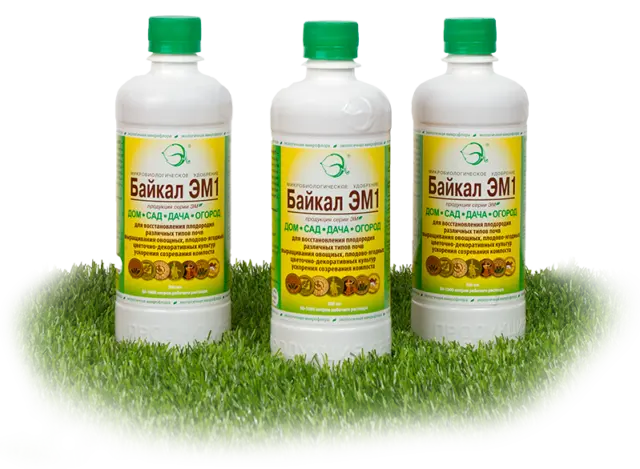
One of the popular fertilizers is Baikal EM-1
To feed the berry in the fall, a good drug called “Baikal EM-1” is suitable. It is sold as a concentrated liquid in bottles of different volumes. In addition to providing honeysuckle with nutrients, the drug will cleanse the soil of the micropathogenic environment. For each bush, a solution is prepared from 10 liters of water and 100 ml of Baikal, poured into the near-trunk circle. After a short period of time, abundant watering is carried out with three buckets of water.
If honeysuckle was fed with the drug in the month of August, then with the onset of October, the procedure is repeated, provided that the autumn is warm without frost. From this, the berry plant will store more moisture and nutrients for the winter.
When using other mineral fertilizers, you must carefully read their composition. Do not use preparations containing a lot of nitrogen. Honeysuckle can awaken the buds laid down for the next year. With the onset of frost, they will die.
Feeding honeysuckle in autumn with phosphate fertilizers
Phosphorus is applied when the weather is still warm outside. However, in its pure form, experienced gardeners do not recommend using the mineral. It is optimal to prepare an NP-K composition from individual components or purchase a ready-made complex with a phosphorus content.
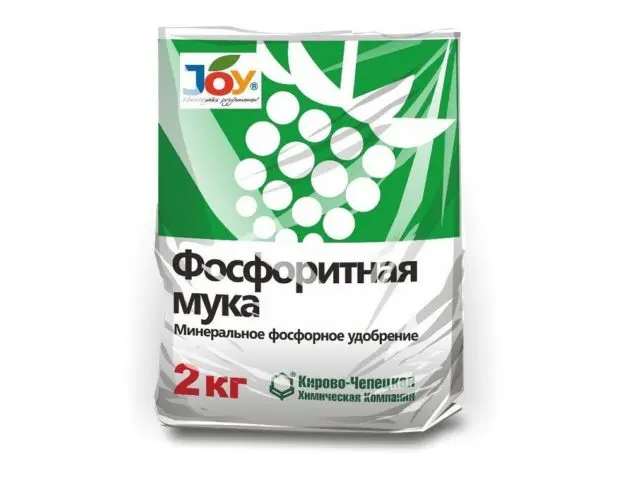
With self-preparation of the composition, you can use phosphate rock
You can independently prepare a complex for the September feeding of honeysuckle according to the following recipe:
- ammonium nitrate – a maximum of 20 g;
- urea – no more than 10 g;
- superphosphate add 50 g.
It is better to dissolve all the ingredients with water, and then feed the plant.
Feeding honeysuckle after picking berries with potash fertilizers
Potassium in its pure form is similarly undesirable to make. Usually they buy a ready-made complex with the content of this fertilizer or make the desired composition on their own.
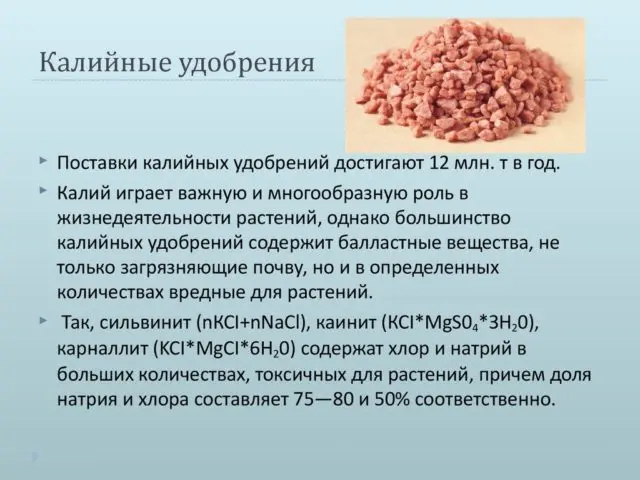
Potassium contains harmful substances that pollute the soil
To feed the berry in September, usually 10 g of superphosphate and potassium sulfur are dissolved in a bucket of water with a volume of 15 liters. Under each bush pour 1 liter of liquid.
Fertilizing honeysuckle after fruiting with organic fertilizers
Organics are often fed not in autumn, but in July-August after picking berries. The easiest option is to mulch the trunk circle with dry compost or humus.
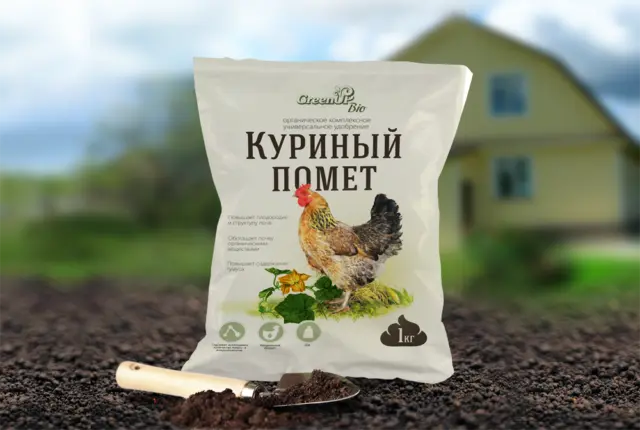
In summer, you can add honeysuckle with a solution of bird droppings
Good stimulation of honeysuckle is given by watering with a solution of mullein infusion or bird droppings. First, 1/3 of the organic matter is soaked in ½ of the water for 2 days. Ready infusion 1 liter is poured into a bucket with 5 liters of water, stirred and watered under the root. The procedure is carried out on a non-hot day.
Feeding honeysuckle after harvesting folk remedies
Siderates are often used as a folk remedy. They successfully replace organics. After decomposition, the top layer of soil is enriched with humus. Peas, mustard, clover and other similar crops are sown as green manure.
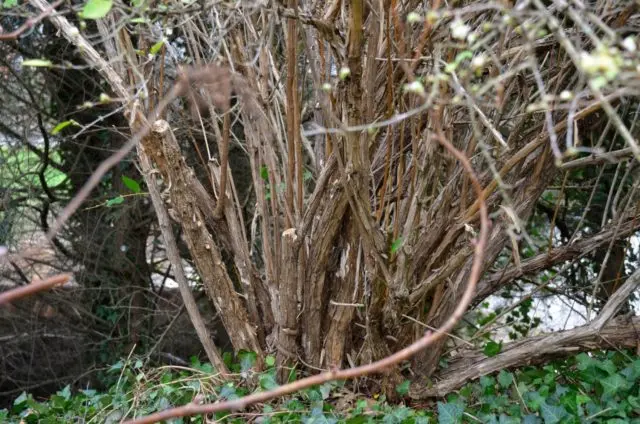
Siderates are mowed and buried under the bushes, where they decompose.
Sowing is carried out immediately after harvesting. The grown green manure is mowed, buried in the ground to a shallow depth so as not to damage the roots. However, the best option is not to bury, but to cover the spread tops on the trunk circle with soil.
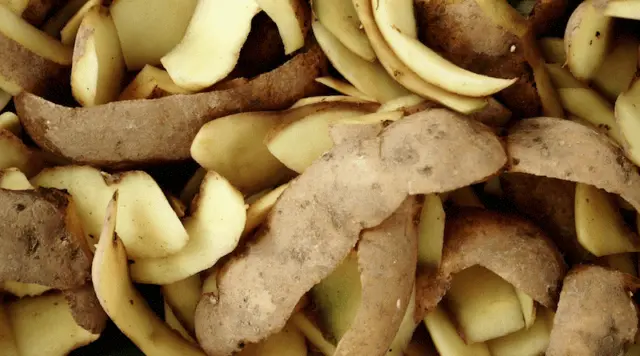
Potato peels are rich in nutrients
From folk remedies, a decoction based on potato peels is also used. Ash is added to it, insisted for about 2 days. The finished solution is poured into a hole dug around the base of the bush.
Conclusion
It is advisable to feed honeysuckle after fruiting immediately so that the berry has time to absorb nutrients. If the process is delayed for cold regions, the plants will enter the dormant stage. A late procedure will not bring a positive result.









